:format(webp)/https://www.thestar.com/content/dam/thestar/entertainment/books/2023/06/08/ambition-power-a-love-story-and-the-physicist-who-invented-the-atomic-bomb/composite.png)
Harriet Alida Lye opens “Let It Destroy You,” her sophomore novel, with a confidently dramatic flourish. At 9:07 p.m. on August 12, 1945 a scientist waits in a holding cell. As night encroaches, he peers at distant rolling hills and discerns lightly falling snow. “But it is late summer, and what falls is not snow, but ash,” the narrator thinks. “The ash is the reason I am here. It is why they are calling me a war criminal.”
His trial, at the Hague, is set to commence the following day. Whatever the verdict, his life will be lessened. “I am innocent,” the man asserts. And: “Perception is everything.” He resigns himself to recollection: “I may as well start at the beginning.”
A dextrous hand at mood and pace, Toronto writer Lye (debut novel “The Honey Farm” and memoir “Natural Killer”) begins the next chapter with “I am here only as a witness.” The speaker is June, estranged wife of August Snow, the prisoner. At the same time and date, June’s thoughts skip from Leora, their daughter, to the circumstances that led to August’s trial. Though a physician, June assisted her husband with paperwork, such as patent applications. Lucrative patents have altered public impressions of Snow’s scientific enterprises; with good reason, June is burdened by thoughts of her own culpability.
Inspired by Leo Szilard, a Hungarian-born physicist known for his integral work on (and patents for) nuclear fission, “Let It Destroy You” examines idealism and ambition, intent and outcome, and, with particular acuity, marriage and the complex, unpredictable ways its faltering can play out. Lye notes that very little of the voice and life of Szilard’s wife, Trude Weiss, were preserved. Fiction enabled the author to explore ways Weiss — who “seemed like a victim in her marriage” — “might have found her power.”
August is nevertheless the novel’s first and final perspective. For him, “the beginning” was the Great War, when he resided in Pest (then “distinct from bourgeois Buda”). As Hungary swooped right, he changed his name and official religious status, fled to Germany, and became a student of Einstein.
August recalls career opportunities in London and then Chicago and illustrates his passions — abundant cheap energy, the fission reactor. A touch megalomaniacal, he once told June, “I want to be remembered as the man who saved the world.” The chapters narrated by Snow do acknowledge June and Leora, but word-for-word the emphasis isn’t marital dynamics, nor matters of the heart. Generally, lab projects, acclaim, rivalries, and wealth quicken his step. With that said, when news reaches him about his child’s illness, August’s driven to work on his “cobalt machine” to help cure her.
June’s musings in alternating chapters are a marked contrast. She touches on her history (a village near Vienna, parents killed in a concentration camp), career, eventual residence in England, and “nomadic life.” Often, though, her reflections settle on her daughter. June discloses her intense love for Leora as well as her anguish when Leora lost a limb to a cancer that eventually recurred.
June views August as “the force who most shaped [her] path.” His character and their ill-fated marriage intrude into her thoughts as well. She once believed their connection was a “most rare and special thing”; in the vicinity of her former husband, and as solitary and deep in thought, she concludes, “our love was doomed from the start.” As she reminisces about a terrible road trip to Vancouver in 1938 and when they tied the knot (“Eventually, August and I decided to wed. Or, more accurately, he finally agreed to my demands”), June underscores their radically different perceptions of a shared past.
As these episodes from a sleepless nights conclude at 6:57 a.m. on the day of August’s trial, Lye’s protagonists linger in the mind. They’re tragic: despite intelligence and capability, they’re separate and anxious and fearful about their own fates and that of the world their own shortcomings have helped usher in.
JOIN THE CONVERSATION
does not endorse these opinions.



